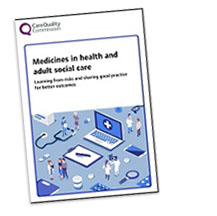This report shows what we found about the common areas of risk when using medicines across health and social care in England.

Overview
We know that people’s physical and mental health outcomes improve when medicines are used in the best or optimal way. When they are not prescribed or administered correctly they can cause harm.
We want to encourage improvement by sharing what we have found through our regulatory work and giving examples of how some providers have reduced these risks.
What we did
We analysed:
- over 200 inspection reports
- 100 enforcement notices
- 1,500 National Reporting and Learning System (NRLS) and statutory notifications from providers.
What we found
There are many examples of how good use of medicines can lead to person-centred care and better patient outcomes. Yet many medication errors happen and we identified common areas of risk where there is a need for improvement across different types of health and care services:
- prescribing, monitoring and reviewing medicines
- administering medicines
- at transfer of care between services
- reporting and learning from incidents
- storing, supplying and disposal
- staff competence and workforce capacity
Download
Medicines in health and adult social care
Medicines in health and adult social care: audio version
Join the conversation
Follow #MedicinesReport on Twitter
Related information
News story: Medicines in health and adult social care: Learning from risks and sharing good practice for better outcomes
Special edition newsletters for:
- acute hospital providers
- adult social care providers
- mental health service providers
- primary care providers
Keep informed
Follow Care Quality Commission on Twitter